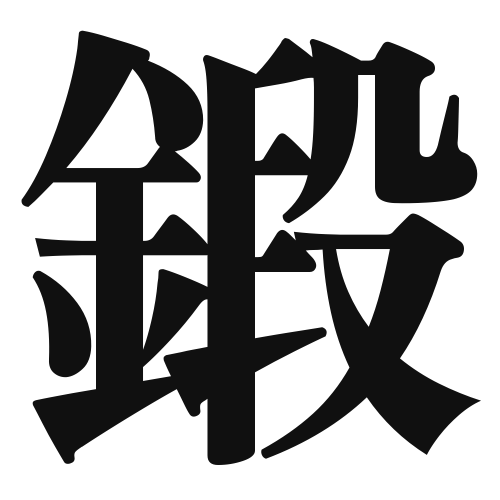1. Overview of Meaning
The kanji “鍛” (tan) means “to forge” or “to train.” It is often associated with the process of strengthening metal through heating and hammering, as well as the concept of training or developing skills, particularly in a physical or mental context.
2. Formation and Radical
Formation of the Kanji: The kanji “鍛” is a phono-semantic compound (形声文字), which combines the meaning of the radical and the phonetic component. The left part, “金” (meaning “metal”), indicates the material involved in forging, while the right part, “旦,” provides the phonetic sound.
Radical: The radical of “鍛” is “金” (metal), which is commonly found in kanji related to metals and tools.
3. Examples of Usage
Common Words and Phrases:
- 鍛える (tanaeru) – to forge, to train
- 鍛冶 (kanaji) – blacksmith
Example Sentences in Daily Conversation:
- 彼は毎日ジムで体を鍛えています。 (Kare wa mainichi jimu de karada o tanaeteimasu.) – He trains his body at the gym every day.
- この金属は鍛えることで強くなります。 (Kono kinzoku wa tanaeru koto de tsuyoku narimasu.) – This metal becomes stronger when forged.
4. Synonyms and Antonyms
Similar Kanji:
- 鍛錬 (tanren) – training, practice (focuses more on the process of training)
- 修行 (shugyō) – training, discipline (often used in a spiritual or martial arts context)
Antonyms:
- 怠ける (namakeru) – to be lazy (opposite of training or forging oneself)
5. Cultural and Historical Background
Relation to Japanese Culture: The concept of “鍛” is deeply rooted in Japanese culture, particularly in the context of martial arts and craftsmanship. The idea of forging not only applies to physical strength but also to mental discipline and character development.
Proverbs and Idioms:
- 「鍛えれば鍛えるほど強くなる」 (Tanaereba tanaeru hodo tsuyoku naru) – “The more you train, the stronger you become.” This reflects the value placed on hard work and perseverance in Japanese society.
